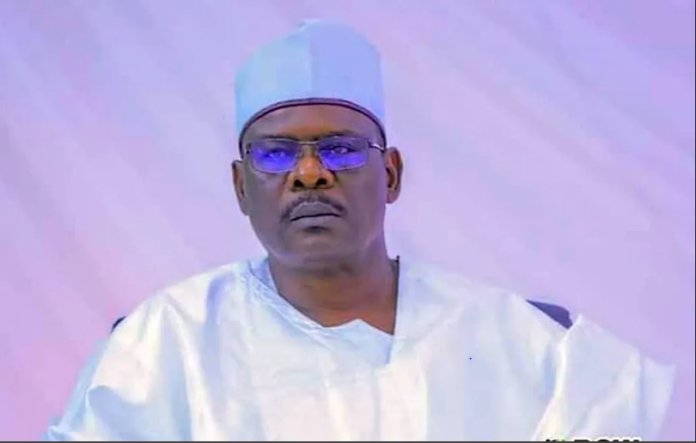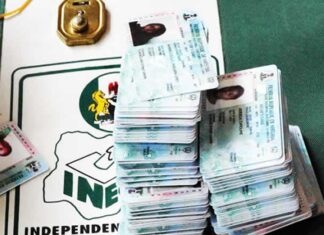Ndume lists wrong priority and timing, insists government reform should come before tax reform
By Jeph Ajobaju, Chief Copy Editor
Senator Ali Ndume (APC, Borno South) has listed wrong priority and wrong timing among his reasons for opposing Bola Tinubu’s Tax Reform Bills even though he is in the same political party as the President.
The Bills passed second reading in the Senate on November 28 through voice vote after which the Red Chamber said the proposals will now proceed to a public hearing.
But the House of Representatives has stepped down the Bills from debate, with fierce opposition against the Bills coming from Northern lawmakers, traditional rulers, and Governors.
Borno Governor Babagana Zulum, another member of the All Progressives Congress (APC), dismissed the Bills as an attempt by Tinubu to empower Lagos to “colonise the North.”
Other critics argue that Tinubu focuses on imposing more taxes on citizens he fails to empower to produce, thereby making them poorer in the face of hyper-inflation.
And there are daily reports of public officials diverting and stealing funds from the federal treasury, into which taxes are paid.
The four critical sectors that determine Nigeria’s economic lift or slump are controlled by the federal government headed by Tinubu:
Security
To enable farmers cultivate food crops. Insecurity prevents farming with the collateral damage of high food inflation.
Foreign exchange (forex)
80 per cent of national consumption and production depend on imported inputs.
Power supply
The economy of any country cannot grow without stable power supply. It is the jugular of manufacturing, a sector that groans across the country.
Fuel pump price
The current high fuel pump price of between N1,200 and N1,500 per litre triggers high transport costs which, in turn, increase the cost of all goods and services, hence the current high inflation rate of more than 33 per cent.
Some CSOs have calculated that fuel price will reduce to N400 per litre if the levies imposed on Dangote Refinery by the Nigerian National Petroleum Company (NNPC) are removed. That will immediately slash transport costs as well as the cost of goods and services across the board.
While Tinubu’s “reforms” are hardly visible, removing levies on Dangote Refinery is a low hanging fruit that he can easily pick, being President and Petroleum Minister, if he really seeks to improve the economy.
He does not have to restore fuel subsidy to achieve this, the huge impact will be felt everywhere, and he knows that regular power supply coupled with affordable fuel price will enable Nigerians to engage in productivity that will lower inflation and boost the economy.
The Tax Reform Bills include a proposal to establish the Joint Revenue Board, Tax Appeal Tribunal, and the Office of the Tax Ombudsman.
One of the bills contains a clause that says Nigerians cannot open a new bank account without a Tax Identification Number (NIN).
Ndume, who was sacked earlier this year as Senate Chief Whip for criticising Tinubu, argued on Channels Television at the weekend that the timing of the Tax Reform Bills is wrong, as the focus should be on governance reforms before tax reforms.
He also cited issues about derivation, Value Added Tax (VAT), and the lack of the acceptance of the Bills by the generality of Nigerians, as well as the country spending over 50 per cent of its budget on recurrent expenditure and debt servicing.
His words: “Yes, reform. But even with reforms, you have to prioritise, time them correctly, and ensure the buy-in of Nigerians because this is a democracy. It is the government of the people, for the people, and by the people.
“First in Nigeria, what we need to do is reform the government. Our personnel and overhead expenditure for 2024 is about 50 to 60 per cent of the budget itself.
“We are here in November, and 20 per cent of the budget has not been implemented. But if you check the recurrent expenditure, it has already been exhausted.
“So, that means over 15 to 20 trillion naira is going into personnel, debt servicing, and recurrent expenditure. We should reform the government, not only the Executive – we need to reform the government holistically.”
Ndume also raised concern that, despite being Executive Bills, the Senate treated them as Presidential Bills, reinforcing the perception of a rubber-stamp Senate.
“Does it say it’s a Presidential Bill or is it supposed to be a Presidential Bill? When you say it’s an Executive Bill and you don’t have the buy-in of the Executive of the State, is it complete?
“That is where the problem lies. We’ve been doing this to the point that they now call us a rubber stamp.”
__________________________________________________________________
Related articles:
Advocacy says fuel price could reduce to N400/litre if NNPC removes levies on Dangote Refinery
Ndume tells Tinubu, your tax reform bills “dead on arrival” at NASS
Ndume says Tinubu “caged in the Villa,” and needs “to wake up” to the reality of national hardship
Betta Edu did not act alone, cartel behind funds mismanagement, Ndume tells Tinubu
Tinubu’s renewed hope agenda a scam for hopelessness, Northern elder fumes
__________________________________________________________________













